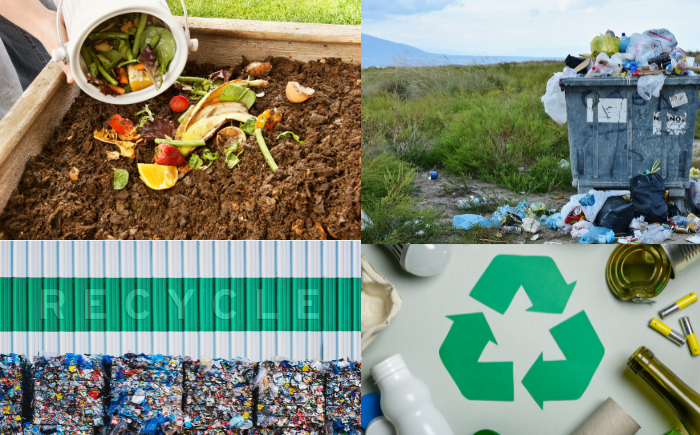How Should Trash And Recyclables Be Stored?
“How should trash and recyclables be stored? This is an important question to answer if we want to take care of our environment.
When we store our trash and recyclables the right way, we help keep our surroundings clean and make sure that things like paper, plastic, and glass can be used again.
Whether you’re at home, work, or just want to help the Earth, it’s good to know how to store your trash and recyclables. In this post, we’ll share some easy tips and rules to help you do it right.
So, let’s begin on the path to better, more eco-friendly living.
The Importance of Proper Trash and Recyclable Storage
Properly storing your trash and recyclables is crucial for a variety of reasons.
- Firstly, it helps maintain a clean and organized living space, preventing unpleasant odors and potential pest infestations.
- Secondly, it ensures that waste and recyclables are collected efficiently, reducing the chances of missed pickups.
- Lastly, it plays a significant role in environmental sustainability by minimizing the risk of contamination and maximizing the effectiveness of recycling processes.
Separate Bins for Different Types of Waste
To start, it’s essential to have separate bins for different types of waste. This separation allows for easier recycling and waste management.
Invest in sturdy bins or containers that are large enough to accommodate your daily waste production.
Consider color-coding them to make it even simpler for everyone in your household to identify which bin is for trash, recyclables, and compost.
Store Trash in a Secure and Sanitary Manner
Trash storage should prioritize both security and sanitation. Ensure that all waste is placed in sealed bags before being deposited in the trash bin. This prevents leakage and the attraction of pests.
Use bins with tight-fitting lids to further minimize the risk of odors and critters invading your trash.
Remember to tie up your trash bags securely to prevent spills or accidents when disposing of them.
Additionally, never leave trash bags outside overnight, as it can attract animals and create a mess.
Recycling: Rinse and Sort Before Storing
Recycling is a crucial aspect of waste management, but it requires some preparation.
Rinse out containers like plastic bottles, cans, and glass jars before storing them in the recycling bin.
This prevents contamination and ensures that recycled materials can be effectively processed.
Sorting recyclables by material type, such as paper, plastic, glass, and metal, will also make the recycling process more efficient.
Is Smelling Toast a Sign of a Heart Attack?
Composting: A Sustainable Solution for Organic Waste
If you have a garden or are passionate about reducing waste, consider starting a compost pile. Composting allows you to turn your organic waste, such as food scraps and yard trimmings, into nutrient-rich soil for gardening.
Use a compost bin or designated area in your yard to store these materials. Remember to avoid adding meat, dairy, or oily items to your compost, as they can attract pests.
Managing Hazardous Waste
Certain materials, such as batteries, paint, and cleaning chemicals, are considered hazardous waste and should be handled with care. To store these items safely, check with your local waste management facility for guidelines on how to dispose of them properly.
Many communities have specific collection days or drop-off locations for hazardous waste, ensuring that it is handled in an environmentally friendly manner.
Storage Location: Indoors or Outdoors?
Deciding where to store your waste and recyclables largely depends on your living situation. If you have outdoor space, consider placing your bins outside, preferably in a shaded area, to minimize odors and prevent sun damage.
Indoor storage is suitable for those living in apartments or areas with limited outdoor space. In this case, choose an area with good ventilation and keep the bins away from living areas to maintain a fresh and clean home environment.
Regular Maintenance and Collection Schedules
Maintaining a clean and organized waste storage system requires regular maintenance. Clean your bins periodically to prevent odors and bacterial growth. Use mild detergents and warm water to wash and disinfect them, ensuring a hygienic storage space.
Familiarize yourself with the waste collection schedules in your area to plan for timely disposal. Missing collection days not only lead to clutter but can also attract pests and create an unsightly environment.
Can a Stye Cause a Headache? Exploring Eye Discomfort and Its Effects
Educate and Involve Your Household
Creating a waste management system involves everyone in your household. Educate and involve your family members or roommates in the process.
Explain the importance of proper waste disposal and recycling, encouraging their participation in maintaining a clean and eco-friendly living space.
By working together, you can make a significant impact on reducing waste and protecting the environment.
In conclusion, knowing how to store your trash and recyclables the right way can make a big difference in taking care of our environment. By following the guidelines and tips we’ve shared in this post, you can play a part in keeping our surroundings clean and helping to reuse valuable materials.
So, remember to ask yourself, ‘How should trash and recyclables be stored?’ and do your part to protect our planet for a cleaner, greener future.
Let’s all do our part in keeping our planet clean and green!







